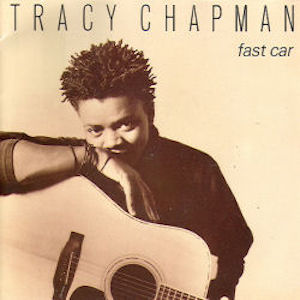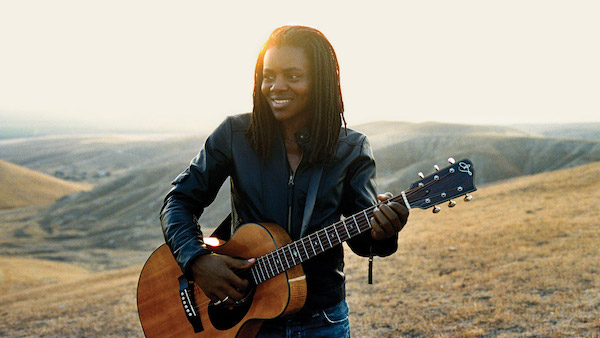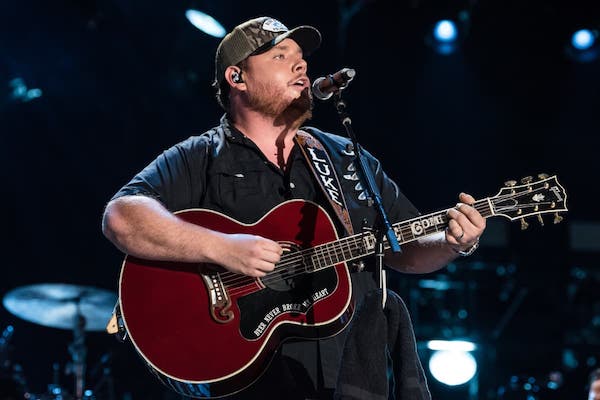Arts Commentary: “Fast Car” — Mainstream Country’s Detour from Diversity
By Daniel Gewertz
Black and openly queer women are not allowed in the Nashville club. Secretly gay white men are not doing too badly, though.

Tracy Chapman’s 1988 hit, “Fast Car,” transformed her from a Boston folkie to a brand-new kind of national pop star. Her eponymous first album sold nine million copies, while her young folk contemporaries were selling more like 9,000. Now, 35 years later, a country music mega-star, Luke Combs, recorded “Fast Car,” and it quickly shot to the #1 spot on the country charts. (Combs is the uncontested new king of country: “Fast Car” is his 16th #1 country hit in a row.)
While “Fast Car” has been recorded, mostly as an album cut, many times, it hasn’t been a smash hit since a young Chapman rode it to the Top 10, and a Grammy win. So, if this news were a tweet, it might read: Male, white, hetero country star hits big with an old song written and sung by a Black lesbian. That’s not a polite sounding newspaper headline even in 2023. Instead, the Washington Post ran a think-piece by music writer Emily Yahr with a headline that trumpets “the complicated response” to Combs’s new cover version.
The thing is… the responses are not all that complicated, because Yahr mostly quotes LGBTQ music sources, and they essentially agree that diversity in country music radio would be a beautiful thing, but they’re not holding their breath about “Fast Car” delivering even an inkling of inclusivity to the Nashville music establishment. I am assuming Yahr couldn’t even get an anodyne comment from any music industry executives, for she includes no quotes from the powers-that-be. No surprise there: Why would the honchos enter into a highly awkward conversation if they could easily avoid it? And more to the point: why would they ever push for representation of LGBTQ and other minorities if they fear the move might lose them more money than they’d gain? (According to a current New Yorker article by Emily Nussbaum, even white women country artists are having a tough time achieving radio airplay: their percentage of “plays” are a disastrous one-third of what they were in 2000.)
Several of the Post article’s quotes fall into the “duh!” or “huh?” categories. Yahr starts off with Holly G., founder of the Black Opry organization, who admits that while it was great to see a country artist influenced by a Black queer woman, “it’s hard to really lean into that excitement knowing that Tracy Chapman would not be celebrated in the industry without that kind of middleman being a White man.”
Quite correct, but also overly evident. To even lower those odds, Chapman has never been a country artist, and she’s effectively been retired for the last 15 years. But point taken about the purposeful lack of inclusivity in mainstream country: Black and openly queer women are not allowed in the club. Secretly gay white men are not doing too badly, though.
Holly G’s co-director in Black Opry, Tanner Davenport, talked about the importance of Chapman’s song to Black and LGBTQ people. “The song almost seems like an anthem for us,” he said. “It’s been pretty monumental in our lives, and I think it made us feel like we weren’t alone.”
“Fast Car” seems a truly odd choice for such monumentalizing. The firs- person narrator of “Fast Car” is clearly not Chapman, but a poor woman stuck in a dead-end life. And more to the point, she is of no specified race, and she is also heterosexual.
So, by awkward accident, this fairly ordinary cover version has revealed a terrible irony. When Chapman — an unlikely star in 1988 — exploded on the music scene with “Fast Car,” it was a gratifying surprise, a possible mark of social progress, a promise for the future. Now, over a third of a century later, the new version by Luke Combs inadvertently exposes the current lack of racial and gender progress in country music.

Singer Tracy Chapman. Photo: WikiCommons
Jake Blount, who calls himself an Afrofuturist folk artist, worried that the current cover of “Fast Car” might harm the original’s legacy: that it will “be overwritten in real time.” He compared Chapman’s situation to what he believes are the sad fates of Big Mama Thornton and Memphis Minnie.
This rates a big “huh?” Big Mama Thornton’s record of “Hound Dog” was a huge R & B hit for her in 1953, selling between 500,000 and one million copies. It was recorded by a dozen other acts before Elvis Presley’s rockabilly version hit the airwaves in ’56, and sold an amazing 10 million, the most of his entire career. Big Mama Thornton’s rendition was then rereleased, and it is safe to say knowledge of her today is largely based on Presley’s “Hound Dog” and Janis Joplin’s 1967 recording of her “Ball and Chain.” Likewise, it is absurd to think that Led Zeppelin’s 1971 recording of “When the Levee Breaks” could possibly do harm to a Memphis Minnie blues recorded way back in 1929. In fact, the Led Zep version prompted further reissues of the original 78 rpm recording.
“Fast Car” has been a staple of oldies radio for over three decades. Was its success a barrier-breaker? Not really. Certainly acoustic, folk-like songs didn’t enjoy an uptick. The song is arguably more famous than its composer. (Chapman had only one other song reach pop’s Top 40 singles chart.) Moreover, in the 35 years since the release of her first album, Chapman has never admitted she is lesbian. She has never answered any questions about her private life. Because of this unusually confidential stance, I contend that she is not an ideal LGBTQ symbol. Pegging “Fast Car” as an LGBTQ song is wishful thinking: about as odd as thinking Cole Porter numbers like “Anything Goes” or “Let’s Do It, Let’s Fall in Love” are gay songs.
The lyrics of “Fast Car” are so broad-gauged and inclusive, they can be interiorized by people of all races and genders. The only thing that seems definitive about its message and sound? Chapman’s yearning yet understated vocals capture the essence of struggling, pent-up youth. You don’t need to have known poverty to feel the song’s frustrations, and the emotional release of the astutely delayed chorus.
One oddity about Chapman’s vocal delivery is the hurried, slurry way she spills a volume of lyrics into the verses: a highly conversational cadence that sounds offhand. It isn’t until the halfway mark that the chorus arrives and finally pumps up the rhythm, with her vocals jumping out on the emotive lines “I had a feeling that I belonged, I had a feeling I could be someone, be someone.”

Luke Combs — his version of “Fast Car” is smoother, less idiosyncratic than the original. Photo: Andrew Wendowski
Combs’s version is a smooth, less idiosyncratic version of the song, with a prominent electric guitar duplicating the repeating hook of the Chapman version. He’s smart not to copy the structural dynamics too exactly, but by dropping the soft acoustic approach in the first half, it’s less mesmerizing: less reflective of the diminished aura of life’s repetitions. Combs gracefully fits all the words into the verse.
Thinking about Chapman’s meteoric success 35 years ago, it is easy to think the music industry might have been more open and democratic back then. But Chapman’s success did not allow anyone similar to enter the pop stratosphere that she inhabited in 1988.
As a Tufts undergrad, Chapman briefly appeared as a street-singer in and around Harvard Square. Still, reports that she had built her following as a busker were exaggerated: her Brattle Street appearances were few. When I saw her, she was not amplified, and sang so softly she was barely audible. Soon, though, there was a definite buzz about her talents locally. I wrote in the Boston Herald at the time that her quickly growing popularity came about through the interest of three distinct audiences: her fans at Tufts, Boston folk fans, and feminist women’s music followers. But little did we imagine she could rocket to international success within a year.
Like many, her ascent was assisted by luck. A fellow Tufts student heard her perform, and he just happened to have a father who was an influential music industry executive. Charles Koppelman signed Chapman a full year before she graduated from Tufts. Elektra Records then came onboard. Her appearance alongside a host of stars at the Nelson Mandela 70th Birthday Concert was broadcast to 87 countries in June 1988. She performed a short afternoon set, but gained far more viewers when she became a last-minute replacement for Stevie Wonder in the evening broadcast.
Listening to her old version of “Fast Car” this week, I found myself hunching forward, expending extra attention on the hushed first verses, with their time-jumping narrative. And I remembered the small groups of listeners on Brattle Street, gathered as if by a magnet, hunching carefully forward to catch the soft yet resolute voice of the shy girl in Harvard Square.
Daniel Gewertz has been influenced by the people he has interviewed for newspapers and radio, including jazz artists Ray Charles, Sonny Rollins, Artie Shaw, Dizzy Gillespie, Jay McShann, Gil Evans, Dave Brubeck, Keith Jarrett, Steve Swallow, J.J. Johnson and Milt Jackson; roots musicians B.B. King, Bill Monroe, Brownie McGhee, Vassar Clements, Phil Everly, Roger Miller, Carl Perkins and Bo Diddley; folkies Libba Cotton, Joan Baez, Pete Seeger, Leonard Cohen, Rambling Jack Elliot, Judy Collins, Roger McGuinn, Steve Goodman and John Prine; classic popsters Tony Bennett, Mel Torme, Eartha Kitt and Pearl Bailey; and film/theater artists Louie Malle, Edward Albee, Jeremy Irons, Glenn Close, Susan Anspach, Yul Brynner, Michael Douglas, Diahann Carroll, Jewel, Jack Klugman and John Sayles. Daniel’s first live interview, at age 16, was with Art Garfunkel in 1966.

Great piece. I always liked Chapman and her original version of Fast Car. As you noted, her race and sexual orientation had nothing to do with the song. Why do some trybto make an issue of itnow? But, truth to tell, I never understood most of the lyrics on the original, due to Chapman’s hallmark soft, slurred delivery. Finally, with the Luke Combs cover, I could understand and appreciate the words. But, not surprisingly, her original has a rawness, an authenticity and an emotional impact that the cover lacks. Too bad she never achieved the level of commercial success her talent deserved.
Thanks for the comment. She DID receive the level of commercial success she deserved, actually. Ver few people ever sold 9 million records of a single album. She also had well selling albums throughout the 90s. She had a top selling single, “Give Me One Reasopn ,” win a Grammy for Best Rock Song, and the album it came from was considered her comeback vehicle. All in all, out of 13 Grammy nominations she won 3, not a bad record. Her last album was in 2008, and won awards in Europe, and nominated for best folk album on the Grammys. She also supported a lot of human rights organizations., did the music for a Athol Fugard play, was quite busy and rich and loved. Oddly, her last album was called “Our Bright Future,” and came out a week after Barrack Obama was elected. I assume it was recorded after his nomination in summer 2008. I don’t know why she retired after touring on that 2008 album. She was about 45. Maybe she was, partly, at a loss when the Obama years didn’t change America very much, and led to a rising of the rightwing. But she had plenty of money, and her albums, though selling fine, weren’t topping the American charts anymore. Overall, she was chosen to be one of America’s top stars for quite a few years, because of her talent, and because she was that rarity, an African-American modern star who was a poetic folkie at heart.
Here’s a paragraph about her popularity… among the ones that didn’t fit in the story —
I’ve always thought that Chapman’s great success in 1988 may have been partly powered by an unexpressed wish. White people — some young, many approaching middle-age — were delighted by the idea of a youthful, eloquent Black singer-songwriter. Here was a young soulful talent touched by brilliance, and music fans who were somewhat indifferent to the dominant Black sounds of the era — hip-hop, dance music, power ballads — harbored a need to celebrate a softer, more cerebral kind of young Black artist. Chapman fulfilled that wish. She was a throwback to the ’60s and early ’70s: a time when message songs could occasionally become Top 40 hits. Her music was poetic, sincere, understated: not qualities found in abundance on the pop charts of 1988. Chapman was also so shy and adorable that even when she sang “Talkin’ Bout a Revolution” she wasn’t threatening.